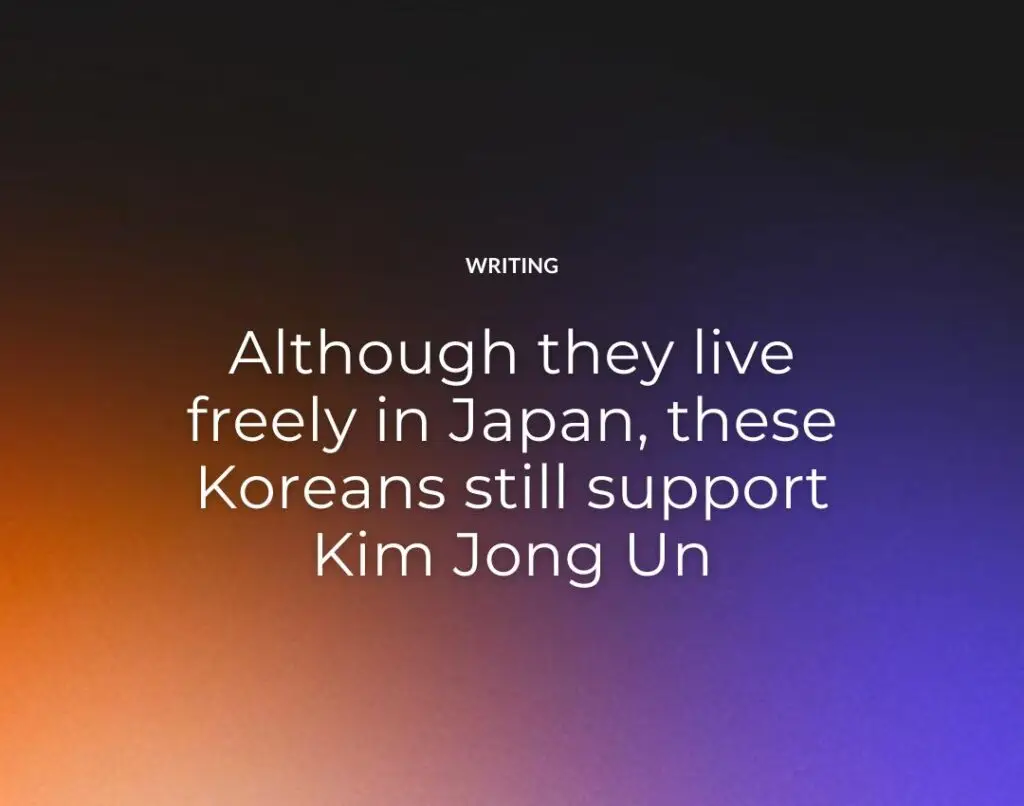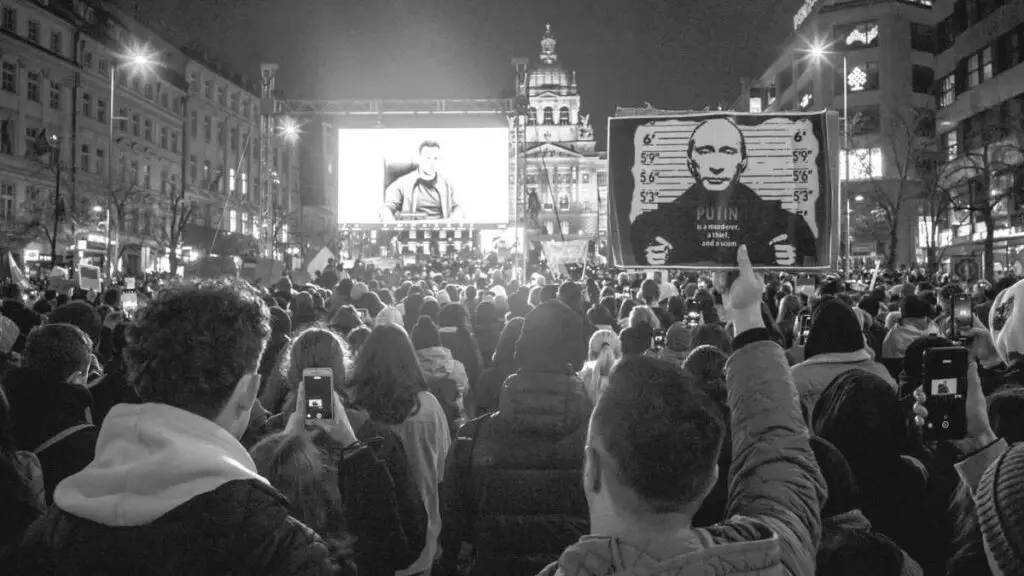By Geoffrey Cain
PRI’s The World
Jul 10, 2014
TOKYO, Japan — Few outsiders will ever get to witness Japan’s surreal state within a state, a network of businesses and schools that have sworn allegiance to North Korea.
It’s a surprising sight: Some 10,000 children at schools all over Japan have been known to goose-step in the presence of portraits of the former dictators Kim Jong Il and Kim Il Sung, marching patriotically to revolutionary music. School field trips typically include excursions to Pyongyang to learn about North Korean history and ideology.
Alongside a regular curriculum of math, literature and science, these “Chongryon schools,” as they’re called, teach North Korean ideologies of nationalism and socialism.
This network owes its existence to a Tokyo-based umbrella organization called Chongryon, which has been likened to the de facto North Korean shadow government in Japan. Tokyo, like its ally Washington, has no formal diplomatic ties with Pyongyang.
Since its founding in the 1950s, Chongryon has sponsored everything from credit unions to newspapers to pachinko parlors, once even raising funds for the Kim regime through criminal enterprises in the 1980s. At its apex, the group claimed allegiance from about two-thirds of Japan’s “zainichi” Koreans — the hundreds of thousands of Koreans whose ancestors lived here primarily as laborers under Japanese colonial rule before 1945. (After Japan and South Korea restored diplomatic ties in 1965, ethnic Koreans who did not voluntarily take South Korean passports essentially became de facto North Koreans.)
Chongryon today is a shred of its former self, struggling with a decade of debt that has culminated in a foreclosure at its Tokyo headquarters. Japanese universities and employers generally disfavor Chongryon schools, which typically feed graduates into the group’s shrinking network of businesses and institutions. In April, North Korean generalissimo Kim Jong Un reportedly injected a lifeline worth $2 million into the organization.
Part of the problem is North Korea’s reputation in Japan. It’s not just the abysmal poverty or the abuse that it inflicts on its own citizens. In 2002, the previous North Korean dictator, Kim Jong Il, personally admitted that his government abducted 13 Japanese citizens in the 1970s and 1980s. The Japanese, most of whom were in their twenties, were kidnapped to help train North Korean spies.
The revelation — long suspected in Japan, but also passed off as a conspiracy theory by leftist intellectuals and writers — fueled the ire of Japan’s hard right, underpinning racist assaults against Koreans.
So why, despite all of this, do some ethnic Koreans in prosperous and liberal Japan continue to side with the dwindling Chongryon empire?
One Kim Jong Un loyalist, who asked not to be named citing a fear of harassment from an anti-Korean group, said that a long tradition of family and community makes it hard to part ways with Chongryon. “Our family is too closely tied to [Chongryon] now,” the middle-aged Chongryon member in Tokyo explained. “Whatever the [anti-Korean] hate groups say, as a child they gave my family a community, for our nation.”
“The press in Japan and the West don’t understand that we see ourselves as Koreans first, and [that] we want our nation unified as one Korea. We do not see ourselves as only North Koreans and we are not crazy or brainwashed,” she said. “We make our own decisions to send our children to these schools.”
She added that many Chongryon loyalists hold South Korean passports anyway. Seoul isn’t that concerned, since it treats North Koreans as citizens of South Korea, claiming sovereignty over the entire peninsula.
In a separate interview, another woman who attended a Chongryon school as a child in the 1980s, but who no longer identifies with the group, said that a history of discrimination in Japan quickly pushed her family into the arms of North Korean sympathizers decades ago. (She also asked to remain anonymous, citing a streak of anti-Korean protests in Tokyo and Osaka last year.)
“Growing up, North Korea was really the best option for Koreans here, even though it might sound odd today,” she said. “They gave us this belonging. They took care of us and showed us that we as Koreans could stand up on our own. South Korea [which was a poor nation back then] just didn’t have as much of a footprint and we felt more connected to North Korean self-reliance.”
“Nowadays we are not as dependent on North Korea. The South is wealthier and more powerful, but I can understand why very old Koreans would feel something with North Korea after they suffered so much under Japan,” she added.
She was referring to the period from 1910 until the end of World War II, when Japan embarked on what was supposedly a nation-building project over the barren Korean peninsula. The Japanese ended up committing a raft of wartime atrocities, and after the war ended, Koreans in Japan continued to be treated as outsiders.
Chongryon prospered as North Korea’s link into Japan for decades, but the Japanese government went full-throttle against the group after the kidnappings were confirmed in 2002.
Kim Jong Il’s admission was a rare act of honesty that backfired. And this incident is still fresh in the minds of some ethnic Koreans, who fear that a recent restart of negotiations between Japan and North Korea over the abductions could spark a similar episode.
During tense negotiations in Beijing on July 2, Tokyo said that it would relax some sanctions in return for progress on a North Korean investigation into the abductions.
But if North Korea “has nothing to offer to please the Japanese, harassment against Koreans will be more serious,” warned Soo-im Lee, an ethnic Korean and researcher at Ryukoku University in Kyoto.
“The social problem of hate speech and hate crimes against Koreans is becoming serious,” Lee said. “Right wingers … hurt Koreans living here, but since Japan has no laws to ban racial discrimination, Koreans and humanitarian Japanese are fighting back against this profound racism.”
Lee based her concerns on a pattern of fringe anti-Korean demonstrations over the past year. Even the US State Department rebuked the hate speech, which most Japanese similarly condemn, in its annual human rights report in January.
“Koreans are cockroaches,” a sampling of protest signs would say from anti-Korean groups like Zaitokukai. “Go back to Korea!” “Kick them out of Japan,” other anti-Korean activists shouted at demonstrations. Protesters even approached ethnic Korean schools, calling students “North Korean spies.”
The article was originally published in PRI’s The World
See Also:






